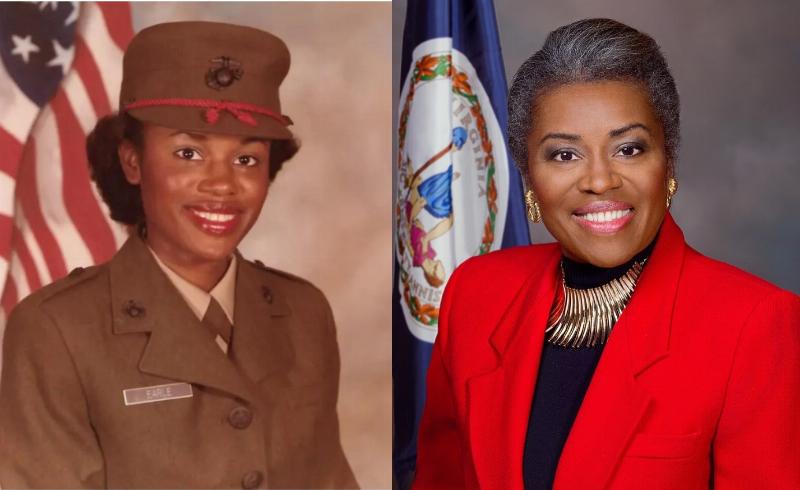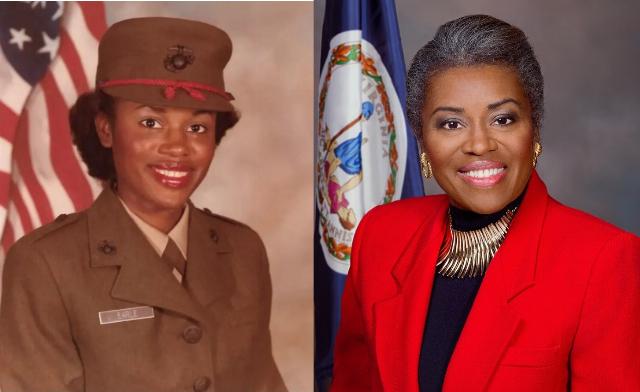


During the Biden Administration, America’s military services all fell short of their recruiting goals.
The COVID pandemic was one factor, but Biden’s policies and actions can’t be ruled out. You might remember Biden’s disastrous and deeply embarrassing withdrawal from Afghanistan, carried out in August of 2021.
Biden’s announcement of intent to fulfill his commitment to withdraw U.S. troops emboldened the Taliban to take control of dozens of districts and to seize power from the Afghan government earlier that month (similar, some might say, to the way Biden’s weakness emboldened Vladimir Putin to invade Ukraine in 2022). The withdrawal culminated in the suicide bombing at the Kabul airport that took the lives of 11 Marines, one soldier, and one sailor, and left more than 45 U.S. service members wounded; more than 170 Afghan civilians were also killed.

Public domain images.
But that shortfall in military recruitments has now been reversed, and the Army, Navy, and Air Force announced this summer that their respective recruiting goals had all been met, months ahead of schedule.
“What about the Marine Corps?” you might ask. The USMC has announced that its recruiting goals have been met (and exceeded, by a single person) for the second year in a row. In 2023, the other branches still missed their goals by thousands; the Army alone came up 10,000 short that year.
This goes to the mystique of the Marine Corps and the respect it engenders in most Americans. Being a U.S. Marine still means what it has always meant. Unlike the other branches, the Marine Corps has not altered its entry requirements nor lowered its standards to meet its recruiting goals. While the Marines may have clerks and computer nerds just like the other branches, each one has managed to survive boot camp and is, first and foremost, a rifleman.
For those of us who have not served, a lot of our knowledge of the Marine Corps comes from personally knowing Marines and/or from movies and TV, many of which are pretty accurate. Fans of TV’s NCIS, for example, might remember when Mark Harmon’s character, Leroy Jethro Gibbs, is admired for his skill at fisticuffs and is asked, “Did the Marine Corps teach you to box?”, and he replies, “No, the Marine Corps taught me to fight!” And who could forget the cinematic depictions of Marine Corps Drill Instructors by R. Lee Ermey (who, before attaining fame playing Gunnery Sergeant Hartman in 1987’s Full Metal Jacket, actually was a Marine Corps D.I.) or Jack Webb in the 1957 film The D.I.?
Had I my life to live over, and knowing what I know now, I’m sure I would have wanted to volunteer for the USMC, even though I’m equally sure that I wouldn’t have made it through The Crucible (if I hadn’t washed out long before that final 54-hour ordeal towards earning the Eagle, Globe and Anchor).
I thought of all this while watching last Thursday night’s Virginia gubernatorial debate between Abigail Spanberger and Winsome Earle-Sears. Earle-Sears, who was born in Kingston, Jamaica, and emigrated to The Bronx in 1970, at age six, served in the USMC from 1983 to 1986; she was a corporal and served as an electrician (she started and ran an electrical, plumbing and home appliance business in Virginia, where she had attended college, earning degrees in English and Economics).
Because she was born in Jamaica, Earle-Sears can, theoretically, never be POTUS, although just think how apoplectic the Democrats would be were she (a dark green Marine) to seek that office. And maybe some papers could be found “proving” that she had actually been born in Hawaii...
Earle-Sears has been heavily criticized for repeatedly interrupting her opponent during the debate. I see that behavior as indicative of the fighting spirit that she either acquired in the Marine Corps or that she already possessed, and the Marine Corps encouraged and enhanced. It’s not a bad thing. Many times during the debate, she turned to directly face her opponent, something Spanberger never did, preferring to stoically and silently gaze straight ahead.
It might be a stretch, but Earle-Sears’s willingness—nay, eagerness—to confront Spanberger and hold her feet to the fire reminded me of “The Marine’s Marine,” Lt. Gen. Lewis B. “Chesty” Puller, the most decorated Marine in history (I wrote about him here), who, while commanding forces at the Chosin Reservoir during the Korean War, is said to have uttered something like, “We’re surrounded. They can’t get away this time.” Winsome Earle-Sears seemed to radiate just that kind of confidence.
It’s true that Earle-Sears’s interruptions and crosstalk often made both candidates’ remarks unintelligible; she should have stifled herself and responded during her allotted time. But in her interruptions, I saw a Marine’s unwillingness to be intimidated and low tolerance for Bravo Sierra.
And if the voters of Virginia choose their next governor based on whose behavior at the debate was the more genteel, perhaps they should consider just how genteel it is for a gubernatorial candidate to steadfastly refuse to condemn her party’s candidate for Attorney General despite that candidate having advocated the murder of a political rival and his children.
That would be Jay Jones; it was de rigueur for Spanberger to condemn his remarks as “abhorrent,” but she bent over backwards to avoid Earle-Sears’s challenge for Spanberger to urge Jones to drop his candidacy. Spanberger also sidestepped the question of whether she would continue to endorse him (just as she sidestepped, several times, the question of whether she would rescind Gov. Glenn Youngkin’s executive order calling for transgender students to use the bathroom designated for their biological sex, not the sex with which they currently “identify”).
Spanberger even went so far as to commit the logical fallacy of tu quoque (or whatabout-ism) by drawing a false equivalency between Jones’s despicable remarks and Donald Trump having said (with a smile!) at Charlie Kirk’s memorial, “[Unlike Charlie], I hate my opponent, and I don’t want the best for them!” By Spanberger’s reckoning, Trump’s remark was every bit as much “violent rhetoric” as Jones’s murderous fantasy.
And it was easy for me to see that it was exasperation over failure to answer a question, or the utterance of outright lies, that caused Earle-Sears to violate the debate protocols (which probably should have been better enforced by the “moderators”).
Spanberger deviated from her stone-faced straight-ahead gaze in reaction to Earle-Sears’s challenges by occasionally smirking, an expression that seems to come easily for her; Earle-Sears even called her out on it at one point.
It made me wonder, had Spanberger been a Marine recruit and Earle-Sears her D.I., just how long it would have been before Earle-Sears strode over and, literally or figuratively, wiped that smirk off Spanberger’s face. I have no doubt that Winsome Earle-Sears had the same thought.
Author’s Note: Stu Tarlowe is a septuagenarian who has been contributing to American Thinker since 2010; most of his work for AT can be viewed here. He also posts on Stu’s Stack o’ Stuff, where subscriptions are still free and where the content is not exclusively political. For more than a decade, Stu was the personal editor for the late Conservative talk radio icon Barry Farber; his tribute to Barry Farber may be read here.
